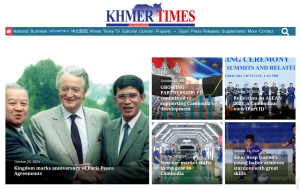There’s a scene in the film “The Big Short,” in which Steve Carrell’s character is interviewing an arrogant mortgage broker who’s describing how easy it is to sell fraudulent housing loans to banks. “I don’t get it. Why are they confessing?” the shocked Carrell character asks his colleagues. “That’s not confessing; they’re bragging,” comes the reply.
There was something of a bragging confession in the Khmer Times’ latest critique of this columnist, penned by the academic Thong Mengdavid, who opted for the curiously egotistical headline, “Balancing Integrity and Responsibility, A Critical Examination of David Hutt’s Journalism on Cambodia.” Balance must have been abandoned in an earlier draft, and one might question the integrity of someone who chooses to publish an article in the Khmer Times, a state-bought newspaper that presumably had to check the dictionary definitions of integrity, responsibility, and journalism before running the article.
It’s becoming slightly laughable to see so much of this gutter rag’s ink spilled over myself – so much so that its own staff now privately offer mea culpas and apologies for “having to collect a paycheck” before publishing the doggerel.
Although not the worst example of this cottage industry, the article drips with contradictions, falsehoods, and innuendo. There are a few reasonable arguments, but most are critiques of my writing style and intentions. Granted, Mengdavid was a little less coarse than another author who dubbed me “a man without a nation, a nomad writer without a family.” But should this be welcomed? Why not have a little more courage? Provide the documents that I apparently lied about? Why let insinuations, the “if’s” and “possibly’s” do all your work?
“Hutt risks being viewed as a ‘mercenary journalist,’” Mengdavid writes, knowing full well that this is how I am viewed by his intended audience and knowing full well that he himself had just spent the previous paragraphs describing me thusly. Sure, cloak inanities in banalities, but why the hesitation? Am I going to sue for slander in a Cambodian court?
One ought not to be too harsh, though. Mengdavid is clearly a social climber. And it obviously boosts one’s profile among certain circles in Cambodia to criticize me in print. So why not? These are plata o plomo – silver or lead – times in Phnom Penh right now. Mortgages and private school fees have to be paid.
Cambodia’s thinking class has been gutted. Some left during the terror of 2022-23, when what was left of the politically-neutral intelligentsia and middle classes were desperate to escape the country and the ruling party’s loyalty campaigns. Those who stayed have either taken the government’s dollar or gone quiet. The few brave ones, most recently the journalist Mech Dara, have ended up in prison.
Just this week, 163 civil society groups signed a letter to the World Bank urging it to condemn the Cambodian government’s assault on human rights organizations. It argued: “While the Cambodian government has a history of repressing and jailing members of the political opposition, the Ministry of Interior’s attempt to criminalize the otherwise legal day-to-day work of registered human rights NGOs and their leaders represents a new level of repression, that threatens the existence of all remaining independent NGOs in Cambodia that provide critical support to the most vulnerable people in the country.”
One hopes that Mengdavid is actually being cynical; that this is all performative. If not, his closing sentence is truly depressing. He argues that my job as a journalist is “to contribute to the socio-economic development of Cambodia and foster constructive diplomacy, not to undermine it.” In other words, the job of the thinking class is to assist the Cambodian government. And then there’s the brag I started talking about: The only person with integrity is the one who is “contributing to constructive dialogue and Cambodia [sic] relations with other nations.”
Sorry, Mengdavid, but a journalist’s job is not to assist Cambodia’s diplomatic relations nor to aggrandize its economic achievements. That’s the job of the government, its propaganda arms, and prostrate intellectuals. There’s more than enough of these people nowadays, quite frankly. A journalist’s job is to inform the Cambodian people of what they need to know, including what their government isn’t telling them. Maybe this is all too easily forgotten since the government has arrested or silenced almost everyone who was doing that.

































